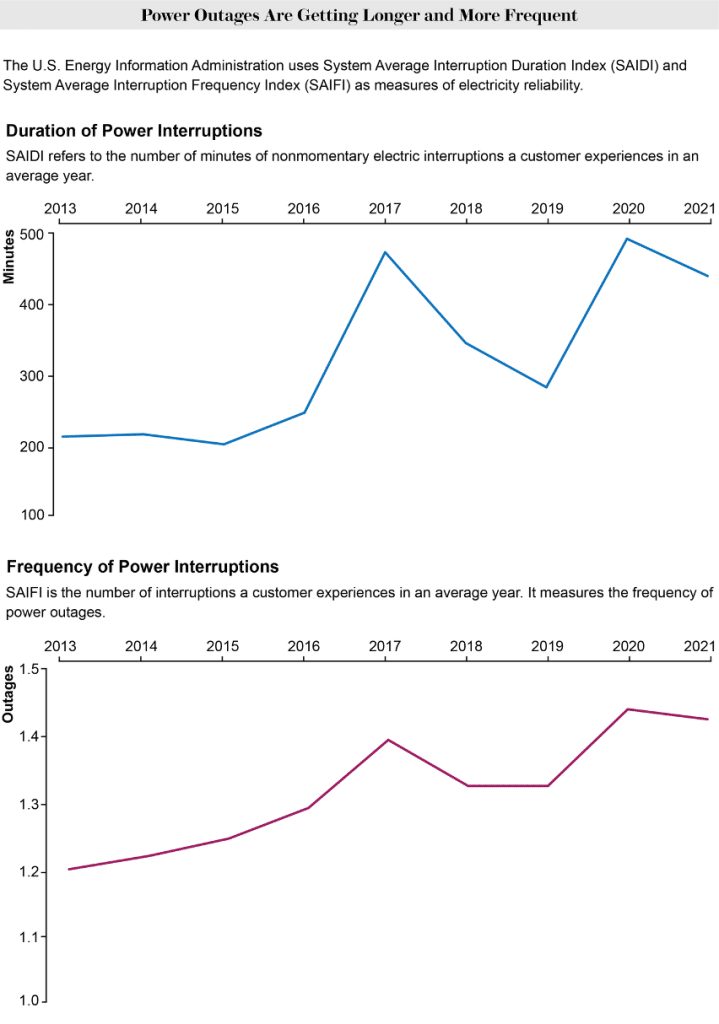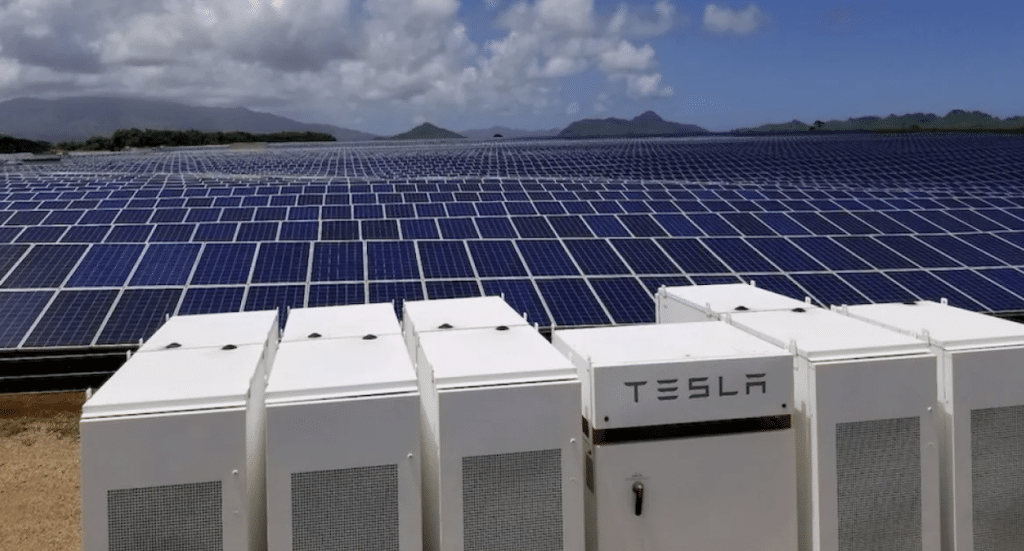In recent years, the question of whether home batteries are worth the price has become more prevalent as the rate of utility outages continues to increase but the cost of home batteries remains somewhat stable. While the question of whether a solar battery is worth the investment is going to be a personal question for each situation, there are a few advantages and considerations everyone should know as they start investigating if it’s the right choice for them.
For most people, batteries represent energy stability in a blackout – an increasingly frequent phenomena. In fact, according to the Energy Information Administration (EIA) the duration of an average outage went from three and a half to seven hours between 2013 and 2021, and frequency increased from 1.2 to 1.42. (Scientific American) As the number of average outages a year creeps towards two, and more of those are a seven hour event, more homeowners begin to feel the inconvenience of losing power and start to think about ways of mitigating the effects.

I want a home battery, but the price is so high
So, why are home batteries so expensive? The answer lies in the technology and materials involved in their production. Home batteries predominantly use lithium-ion technology, which relies on materials such as lithium, cobalt, nickel, and graphite. Lithium is a key component for its ability to store and release energy efficiently, while cobalt and nickel enhance battery performance. However, the cost of these materials can fluctuate due to market demand and geopolitical factors. The high cost of cobalt, coupled with concerns about ethical mining practices, has prompted efforts to reduce or eliminate cobalt content in batteries. As technology advances, research focuses on alternative materials and chemistries to make home batteries more cost-effective and sustainable in the long run, but on average, a home battery can still cost several thousand dollars. This price can be a deterrent for many homeowners and many people are in the mindset of “holding out” to see if the price will drop. But will it? The battery storage industry is driven in part by the adoption of Electric vehicles (EVs) and according to Bloomberg battery prices will continue to drop steadily but very incrementally as technology improves. However, as the raw materials, supply chains and supply/demand have enough of an effect on prices that some automakers are predicting a rise in cost over the next five years, although expecting prices to taper off by 2030 (BloombergyNEF).
So, Will home batteries get cheaper? The answer seems to be: maybe, but not dramatically, and not quickly.
Of course, the trajectory of home battery prices also depends on ongoing technological advancements, manufacturing efficiency, and market competition. As the industry matures, economies of scale and increased production could potentially lead to a modest reduction in prices. However, predicting the exact timeline for significant cost reductions remains challenging.
So, is a home battery worth it?
If the prices are the considerations, what are the advantages to having a home connected to an energy bank? Most basically, home batteries provide a reliable backup power source during outages. When grid power fails, most batteries are wired to take over essential home functions. What gets powered depends on what you chose to connect, and what the battery is able to power. Most people opt for lights, and appliances related to cooking and storing food and their outlets. In the winter many people have heat connected, but running AC at full power requires a LOT of power, so if you want AC, you’ll have to either turn it down or opt for a larger battery storage solution. For most people, a battery backup means you’ll stay happy and pretty comfortable during an outage, but for people with medical equipment that requires power to run, or elderly or young children who need a moderate temperature, a backup may be even more necessary.
The duration for which the battery can sustain your home depends on its capacity and the energy demands of your household. Once grid power is restored, the battery system can either switch back to grid power or continue operating in tandem, depending on the setup and configuration.
Do I need solar power to have a battery backup?
No, you do not necessarily need a home solar system to have a battery backup. While many home battery systems are designed to work in conjunction with solar panels to store excess solar energy, standalone battery systems are also available. These standalone systems can be charged from the grid during times of low electricity demand or lower rates, ensuring the battery is ready to provide backup power during an outage. However, incorporating a home solar system can enhance the sustainability and efficiency of your energy storage, as solar panels contribute to charging the battery with renewable energy. The decision to install a home battery system, with or without solar panels, depends on your specific energy needs, goals, and local conditions.
For some homeowners, the reliability and sustainability benefits may outweigh the initial cost, making home batteries a worthwhile investment. However, it’s crucial to acknowledge that a home battery might not be the right choice for everyone. Those with low energy consumption or limited access to renewable energy sources may find the current costs less justifiable.
In conclusion, the question of “Are home batteries worth it?” requires careful consideration of individual circumstances. While the prospect of lower prices in the future is plausible, the current expense can be a significant factor for many. As the industry evolves, potential buyers should assess their energy needs, local conditions, and budget constraints before deciding whether to invest in a home battery.
